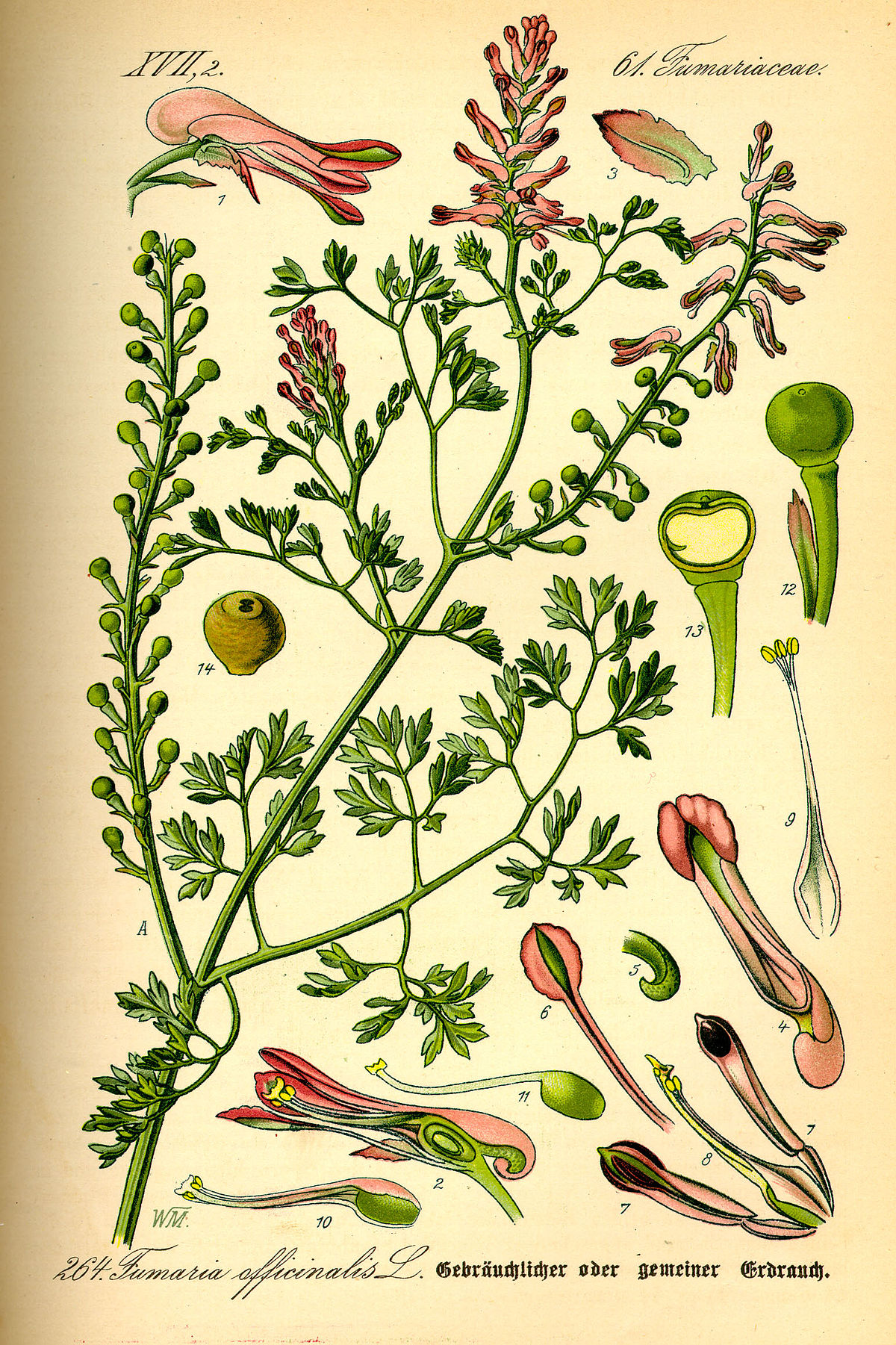Fumaria officinalis

Public Domain, Link
I’ve got fumitory growing in the disgraceful thicket which is my lawn… apparently it’s great for leprosy, scabs, and the juice dropped into the eyes clears the sight and takes away redness and other defects, although, not surprisingly, it hurts a lot and makes you cry.
According to Nicholas Culpeper (born in 1616 , he was an English pharmacist, physician and astrologer and wrote The Complete Herbal and English Physician in 1653), Fumitory can be used for the following…
“…it opens and cleanses by urine, helps such as are itchy, and scabbed, clears the skin, opens stoppings of the liver and spleen, helps rickets, hypochondriac melancholy, madness, frenzies, quartan agues, loosens the belly, gently purgeth melancholy, and addust choler: boil it in white wine, and take this one general rule. All things of a cleansing or opening nature may be most commodiously boiled in white wine. Remember but this, and then I need not repeat it.”
Also according to Culpeper…
Fumitory
Descript.
Our common Fumitory is a tender sappy herb, sends forth from one square, a slender weak stalk, and leaning downwards on all sides, many branches[81] two or three feet long, with finely cut and jagged leaves of a whitish or rather blueish sea green colour; At the tops of the branches stand many small flowers, as it were in a long spike one above another, made like little birds, of a reddish purple colour, whith whitish bellies, after which come small round husks, containing small black seeds. The root is yellow, small, and not very long, full of juice while it is green, but quickly perishes with the ripe seed. In the corn fields in Cornwall, it bears white flowers.
Place.
It grows in corn fields almost every where, as well as in gardens.
Time.
It flowers in May, for the most part, and the seed ripens shortly after.
Government and virtues.
Saturn owns the herb, and presents it to the world as a cure for his own disease, and a strengthener of the parts of the body he rules. If by my astrological judgment of diseases, from the decumbiture, you find Saturn author of the disease, or if by direction from a nativity you fear a saturnine disease approaching, you may by this herb prevent it in the one, and cure it in the other, and therefore it is fit you keep a syrup of it always by you. The juice or syrup made thereof, or the decoction made in whey by itself, with some other purging or opening herbs and roots to cause it to work the better (itself being but weak) is very effectual for the liver and spleen, opening the obstructions thereof, and clarifying the blood from saltish, choleric, and adust humours, which cause leprosy, scabs, tetters, and itches, and such like breakings-out of the skin, and after the purgings doth strengthen all the inwards parts. It is also good against the yellow-jaundice, and spends it by urine, which it procures in abundance. The powder of the dried herb given for some time together, cures melancholy, but the seed is strongest in operation for all the former diseases. The distilled water of the herb is also of good effect in the former diseases, and conduces much against the plague and pestilence, being taken with good treacle. The distilled water also, with a little water and honey of roses, helps all sores of the mouth or throat, being gargled often therewith. The juice dropped into the eyes, clears the sight and takes away redness and other defects in them, although it procure some pain for the present, and cause tears. Dioscorides saith it hinders any fresh springing of hairs on the eye-lids (after they are pulled away) if the eye-lids be anointed with the juice hereof, with Gum Arabic dissolved therein. The juice of the Fumitory and Docks mingled with vinegar, and the places gently washed therewith, cures all sorts of scabs, pimples, blotches, wheals, and pushes which arise on the face or hands or any other parts of the body.


